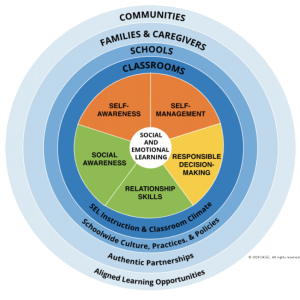School Counseling
The Burnt Hills-Ballston Lake K-12 School Counseling program is designed to enhance the academic, career, and social-emotional development of our students. The mission is to provide all students with comprehensive and developmentally appropriate activities, services, and counseling to maximize student success. School counselors, directly and indirectly, help students apply academic achievement strategies, manage emotions, apply interpersonal skills, and explore career pathways. School counselors help set students on a path for postsecondary success including higher education, vocational training, military, and/or the workforce.
School counselors are K-12 certified/licensed educators with a minimum of a master’s degree in school counseling, making them uniquely qualified to address all students’ academic, career, and social/emotional development needs. School counselors are student advocates who collaborate with teachers, administrators, families, and community members to create a culture of success for all. Though daily roles may look different at each grade level, our driving principles remain the same at all levels: School counselors provide critical social-emotional and academic supports, to promote success and achievement for all students, and to help set students on a path for postsecondary success.
What is the role of a school counselor?
Elementary School: The work of elementary school counselors focuses on building baseline social skills like self awareness, social awareness, and self management. Classroom presentations and small group activities cover topics such as career awareness, effect problem solving strategies, and academic skill building. Elementary school counselors provide curriculum that supports the learning environment and has a positive impact on student success. [Read more here.]
Middle School: Middle school counselors focus on helping students balance the demands of school, family, and friends. Special attention is paid to teaching study, organizational, and time management skills. Social skills like cooperation, teamwork, independence, and responsible decision making are also emphasized. Continued career exploration is also facilitated. Counselors are available as resources to families as students navigate their way through middle school. [Read more here.]
Visit the O’Rourke Middle School Counseling Center HERE
High School: High school counselors help students in areas of academic achievement, career development, and social emotional growth. Counselors provide individual academic planning and goal setting; post secondary exploration including higher education, military or entrance to the workforce; and collaboration with families, teachers, and administrators to promote student success. The goal of the high school counseling team is to contribute to the academic, social, and career development of students as they transition from teenagers to well-rounded, productive adults. [Read more here.]
Visit the BH-BL High School Counseling Center HERE
Social-Emotional Learning (SEL)
Why SEL?
According to the Collaborative for Academic, Social and Emotional Learning (CASEL), the world’s leading organization promoting integrated ac ademic, social and emotional learning for all children in schools, social and emotional learning (SEL) is the process through which all young people and adults acquire and apply the knowledge, skills, and attitudes related to 5 key areas:
ademic, social and emotional learning for all children in schools, social and emotional learning (SEL) is the process through which all young people and adults acquire and apply the knowledge, skills, and attitudes related to 5 key areas:
- Self Awareness: The ability to understand one’s own emotions, thoughts, and values.
- Self Management: The ability to manage one’s own emotions, thoughts, and behaviors and achieve personal and collective goals.
- Social Awareness: The ability to understand the perspectives of and empathize with others, including those from diverse backgrounds, cultures, and contexts.
- Relationship Skills: The ability to establish and maintain healthy and supportive relationships and to effectively navigate settings with diverse individuals and groups.
- Responsible Decision Making: The ability to make caring and constructive choices about personal behavior and social interactions across diverse situations.
Why is SEL so important?
SEL helps children by promoting their health and well-being and contributing to the prevention of violence, truancy, bullying, and drug and alcohol abuse. In addition, SEL is associated with significant gains on academic achievement tests as well as decreased anxiety and behavior problems.
SEL and Community
According to CASEL, SEL is most beneficial when it is integrated throughout the school culture and includes collaboration with families and caregivers.
CASEL Research
In July 2017, a meta-analysis based on a 2011 CASEL report was published in the journal, Child Development. The analysis reports that when schools implement SEL programs with fidelity, they may see a long-term positive impact in their school. Most notably:
- Benefits were similar regardless of students’ race, socioeconomic background, or school location
- Students’ academic performance 3.5 years later is higher by 13 percentile points compared to non-SEL peers
- More positive social behaviors, fewer conduct problems, and lower drug use
The overall findings from this review suggest there is tangible value in implementing SEL programming for students and their community.
CASEL Video: SEL for Parents English Version | Spanish Version

